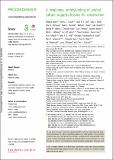A deepening understanding of animal culture suggests lessons for conservation
Abstract
A key goal of conservation is to protect biodiversity by supporting the long-term persistence of viable, natural populations of wild species. Conservation practice has long been guided by genetic, ecological and demographic indicators of risk. Emerging evidence of animal culture across diverse taxa and its role as a driver of evolutionary diversification, population structure and demographic processes may be essential for augmenting these conventional conservation approaches and decision-making. Animal culture was the focus of a ground-breaking resolution under the Convention on the Conservation of Migratory Species of Wild Animals (CMS), an international treaty operating under the UN Environment Programme. Here, we synthesise existing evidence to demonstrate how social learning and animal culture interact with processes important to conservation management. Specifically, we explore how social learning might influence population viability, be an important resource in response to anthropogenic change and provide examples of how it can result in phenotypically distinct units with different, socially learnt behavioural strategies. Whilst identifying culture and social learning can be challenging, indirect identification and parsimonious inferences may be informative. Finally, we identify relevant methodologies and provide a framework for viewing behavioural data through a cultural lens which might provide new insights for conservation management.
Citation
Brakes , P , Carroll , E L , Dall , S , Keith , S , McGregor , P , Mesnick , S , Noad , M , Rendell , L , Robbins , M , Rutz , C , Thorton , A , Whiten , A , Whiting , M , Aplin , L , Bearhop , S , Ciucci , P , Fishlock , V , Ford , J , Notarbartolo di Sciara , G , Simmonds , M , Spina , F , Wade , P , Whithead , H , Williams , J & Garland , E C 2021 , ' A deepening understanding of animal culture suggests lessons for conservation ' , Proceedings of the Royal Society B: Biological Sciences , vol. 288 , no. 1949 , 20202718 . https://doi.org/10.1098/rspb.2020.2718
Publication
Proceedings of the Royal Society B: Biological Sciences
Status
Peer reviewed
ISSN
0962-8452Type
Journal item
Description
Funding and support as follows: Whale and Dolphin Conservation to P.B.; Royal Society New Zealand Rutherford Discovery Fellowship to E.L.C; Radcliffe Fellowship, Radcliffe Institute for Advanced Study, Harvard University, and Biotechnology and Biological Sciences Research Council grant no. [BB/S018484/1]to C.R.; Human Frontier Science Program grant no. [RGP00049] to A.T.; Royal Society University Research Fellowship grant no. [UF160081] to E.C.G.Collections
Items in the St Andrews Research Repository are protected by copyright, with all rights reserved, unless otherwise indicated.

